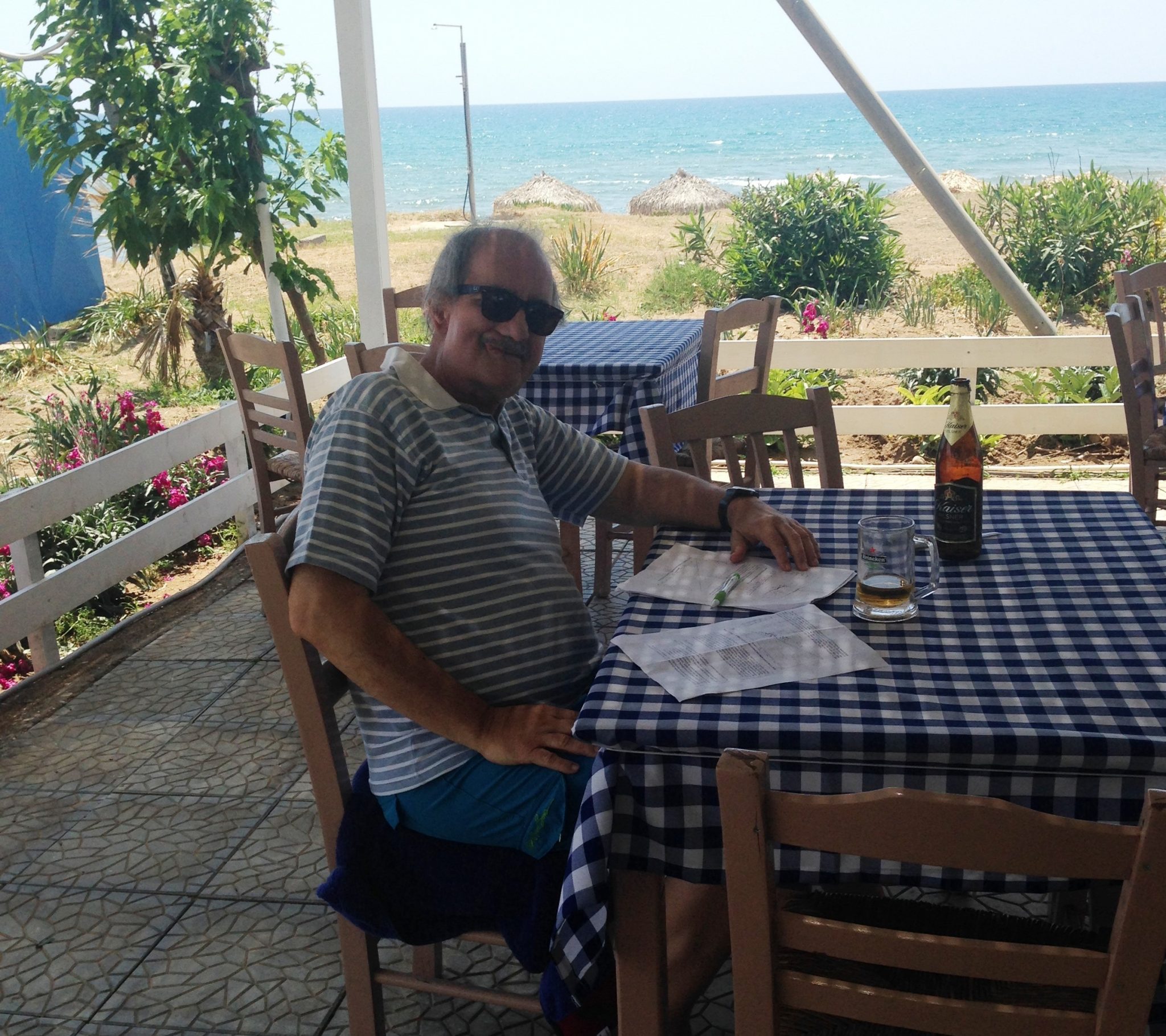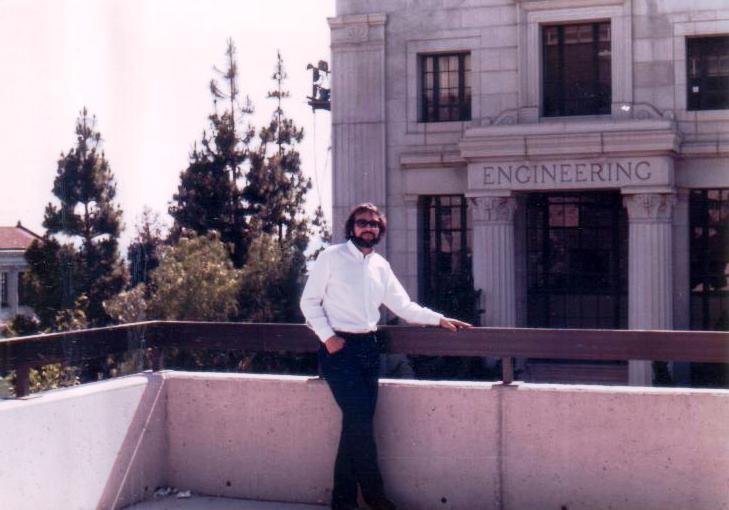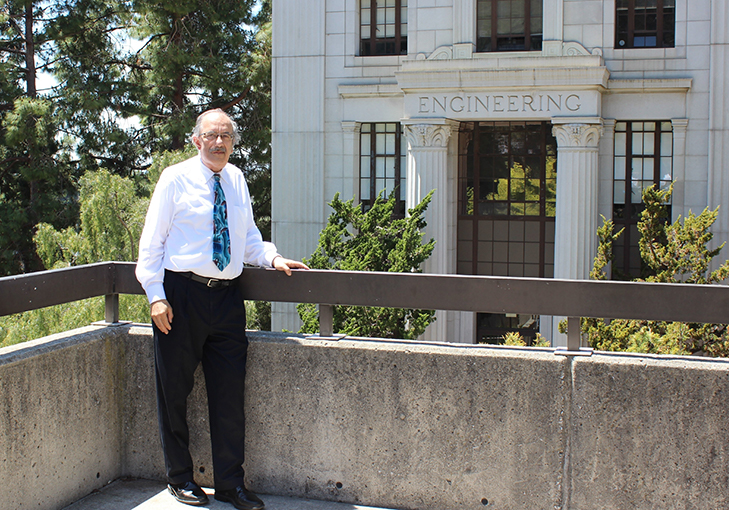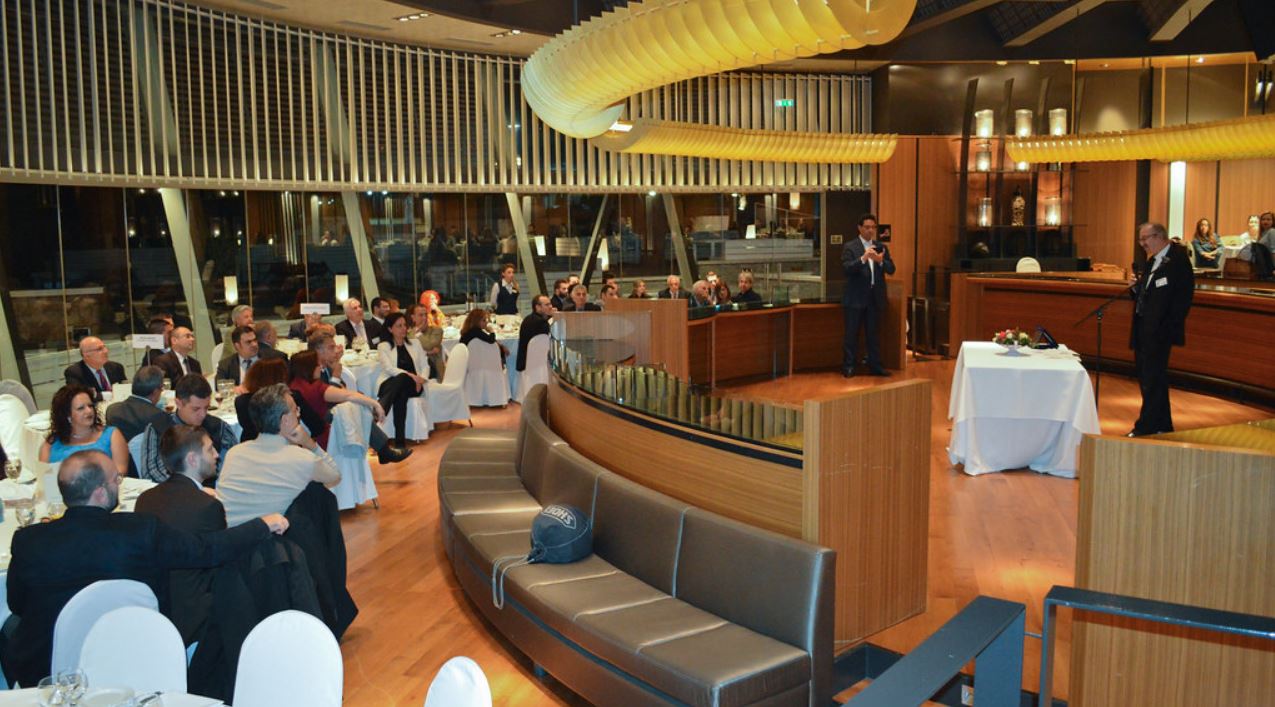August 19, 2020
“Every day is Saturday,” says Kittelson Senior Principal Planner Alexander Skabardonis of his recent official retirement. In answer, Kittelson’s Rick Dowling says, “I hope you’ll still have some Mondays for us.”
Alex still has Mondays. So many, in fact, it’s tempting to take the word “Ëœretirement’ with a grain of salt in his case. In addition to ongoing projects with Kittelson, he is on research recall status at University of California, Berkeley, serves on three Transportation Research Board Committees, and recently received a Fulbright award to work with academics in Greece. “So you see, really nothing is going to change,” he says. “I’m retired, every day is Saturday and surprisingly, I increase my income.”

Alex in his “new office” at his mother’s village on the Greek coast, 10 miles from the birthplace of the Olympic games.
Juggling competing interests and responsibilities is nothing new for Alex. His new schedule is luxurious compared to his pre-retirement regimen. “Long nights, long days – that was how I fit it all in,” he says. “Now, I sit down and have a nice breakfast, time goes around 9:00 o’clock. Okay, working, doing things, 6:00 pm, that’s that. Contrast this with earlier days, I wake up early, have coffee, go to the office at 7:30 am, come back home 9:00 pm.”
Alex’s eventful 38-year career brought him international recognition and a network of friends, colleagues, and admirers from around the globe. When he joined Dowling Associates, now Kittelson’s Oakland office, in 2003, he already had ties to the company dating back in some cases to the mid-“Ëœ80s. Both Kittelson founder Wayne Kittelson and former CEO Mark Vandehey served on the Transportation Research Board’s Highway Capacity Committee with Alex. Many Kittelson engineers and planners, including Mark, also passed through his sphere of influence at the UC Berkeley Department of Civil and Environmental Engineering, where he has been a professor in residence since 1982.
“Berk had an interesting tradition where every afternoon you’d gather to play ping pong in an open area outside,” Mark remembers. “I don’t recall Alex being a big ping pong player, but I spent a lot of time chatting with him during these get-togethers. One of the things I’ve loved about him is that as accomplished as he is, he’s a very humble, fun-loving, down to earth person.”
“I’m pretty sure people at Kittelson don’t appreciate the impact he’s actually had on our company, says Wayne. “He’s sort of invisible to everyone but the people he’s directly working with. The impact he has by working with us – the reputation he brings us is really significant.”
Over the years, Alex co-authored numerous papers with Kittelson planners and engineers. “He was a real asset to the research practice at Kittelson,” says Rick Dowling, a senior principal engineer at Kittelson and founder of Dowling Associates. “He contributed a lot to the first two papers I published. Having his name on it added more weight to the paper. His reputation lent an aura to what we were doing.”
Alex’s body of work covers a range of traffic operations subjects, including traffic flow theory and models, traffic management and control systems, design, operation and analysis of transportation facilities, ITS, energy and environmental impacts of transportation, and automated and connected vehicles.
His interest in traffic began at an early age on trips to the city with his father, a construction worker. Athens, Greece, where he grew up, was in the midst of a building boom. “I went into transportation because traffic from home to downtown was awful,” he says. “Everyone was delayed. I thought there had to be a better way.”
Finding the better way became the object of Alex’s career. At UC Berkeley, he helped found and served as the research leader for California PATH, a statewide intelligent transportation system (ITS) research center. He has published over 360 papers and technical reports and served as the principal investigator for over 80 research projects.
He left Greece for the UK in the late “Ëœ70s to study at Southampton University on scholarship, where he finished both his master’s degree and his PhD in just three years.
“I always wanted to be a consultant in Greece,” he says, “But I never wanted to come to the U.S. I thought, if I go to the U.S, I’ll want to stay. I decided to go to England – much safer. Bad weather, bad food, rain.” Then he began working in research. “I found that all the sources were from the U.S.”
In the end, he accepted a six-month posting at UC Berkeley and never left. “Nice weather, cappuccino outside in the café – you see what will happen to you – this is angels,” he says. “I never changed the place, just changed responsibilities. I don’t know how to do interviews, I never had to.”

Alex in front of the Engineering Building at Berkeley in 1982, the first year he was a professor in residence.

Alex in front of the Engineering Building at Berkeley in 2012, 30 years later.
Alex emphasizes how important people were in his decision to stay. Fostering connections with people remained vitally important throughout his career.
“His professorship was a perfect role for him,” says Wayne. “Even to this day, if you talk to the kids we interview at Berkeley, he’s one of their favorite professors – he engages, he’s humorous and insightful at the same time – he cares.”
“Whenever I went down for a visit to the Oakland Office, Alex would take a break when he was on campus at Berkeley and come see me,” says Mark. “I knew what a busy person he was and how many demands there were on his time. That meant a lot to me.”
Alex is in his element in the intellectual and social whirl of TRB’s annual conference, which he has attended every year since 1985. “I find TRB very stressful and very enjoyable,” he says. “It’s only five days and you hope to see a lot of people and friends. It’s not a time to sleep, it’s time to do things.”

Alex receives an award from the TRB Highway Capacity Committee for his outstanding work in leading the Simulation Task Force. With him are Mohammad Hadi on the left (Professor at Florida International University) and Kaan Ozbay on the right (Professor at New York University).
Involvement in TRB committees has been a constant thread in Alex’s career. “There were many committees – now I have reduced them.” About the TRB’s Traffic Flow Theory Committee, of which he is a lifetime member, he says “I cannot escape.” He has also served on the Freeway Operations, Highway Capacity, and Quality of Service Committees.
Data is a long-time interest, and Alex holds co-developer credit for several large-scale databases, including the Caltrans California Freeway Performance Measurement System (PeMS).
“He always knew where to get data,” says Senior Engineer Jorge Barrios, who worked with Alex at Dowling Associates, now Kittelson’s Oakland office. “Whatever freeway we were studying, if we were running into trouble getting data, Alex could always help.”
“His ability to pull things up from memory comes in so handy when you’re working with him on a problem. Wherever he has something, in his files, back home, he knows where to find it,” says Rick.
“That’s why I love working with him on research projects,” says Mark. “He’s like a walking library. Who needs to do a literature review when you’ve got Alex on your team?”
“He once sent me a copy of a paper I wrote in 1978,” says Wayne. “Just pulled it out of a stack somewhere.”
“I have a picture of Wayne he probably forgot,” Alex laughs. “San Francisco, 1984, when I first met him. I asked him, ‘What do you do?’ He said, ‘I’m going to build a consulting firm.'”‘
Alex has always engaged with transportation innovations that could positively impact the environment and public safety. While earlier traffic operations databases detailed only driver behavior on a highway segment, these days he finds himself focusing on complete streets – how to integrate pedestrians, bicyclists, transit, and automobiles into the same road space formerly occupied only by cars.
“Now the world is more ready to integrate these other modes,” he says. “And, of course, let’s not forget automated vehicles.”
In the U.S., the biggest hurdles Alex sees to effectively implementing AVs are connection, planning, and legal and organizational issues. Perhaps the most important barrier is the American habit of discontinuity. “In America, we’re very hot or cold,” he says. “That’s a problem. We run hot for a while, then the program dies.” The result is that things that have been tried are often tried again without addressing the real problems identified in the previous runs.
“It’s not a technical issue,” says Alex. “In 1997, we did an automated experiment in San Diego – seven cars going 70 mph on the freeway. 2,000 people, no accidents. When I go to TRB last year – they have a little van that will take you a half a mile and is automated on a display. I didn’t know what to do, to cry, to laugh.”
Smart traffic signals have suffered a similar fate in the U.S. According to FHWA, 260,000 smart traffic signals were to be deployed in the US by 2006. As of today, only 1,000 have materialized. The overriding issue again is logistical. “They never said who was going to pay for it, who was going to maintain it. Is the city? The DOT, the federal government, the private companies?” Without shared standards, the old way of doing things lingers on, some cities pulling ahead, others lagging behind.
“I was at a conference on automated vehicles in Florida – Miami – nice time to go. An agency speaker says, ‘We’re doing great transportation improvements! We’re coordinating our traffic lights.’ What? Something that happened in 1950? So I had to get up and leave.”

Alex at the 2015 Kittelson Oakland holiday party.
Despite Alex’s continued involvement in Kittelson projects, his day-to-day presence will be missed.
“I feel incredibly lucky to have been able to spend a lot of time with one of the true icons in our profession,” says Mark. “I don’t use that term lightly. To get the opportunity to not only interact with him as a colleague over the years, but then have him be part of Kittelson is truly special.”
“There are people who just focus on detail, but he’s one of those guys who can step back, see the bigger picture, and remind you of these simple facts – obvious things that you forget because you are so deep in the weeds,” says Rick.
“He brings a very welcome degree of irreverence to a lot of things we do,” says Wayne. “He’s a skeptic. He just cracks people up.”
“I try to question everything,” Alex says. “I also believe everything can be done. In transportation, everything has been done by somebody, sometime, somewhere in the good US of A.”
In the early 2000s, Alex had a life-threatening experience with an aggressive form of cancer. He successfully fought it and has been in remission now for five years.
“He marks those milestones, reminds me of it, tells me how much he loves life and that he has these opportunities to continue on,” says Wayne. “It really just reinforces for me the importance of life every day, the importance of family.”
“I’m really grateful because I have very good friends,” says Alex. “Being busy helped me through,” In the five years he battled with cancer, he had seven surgeries and co-authored 35 publications. “It’s a certain way to deal with things,” he says. “The world can change and will change. And my goal, I want to live, and I will live.”

Alex Skabardonis receiving a lifetime achievement award from the Greek TRB in 2013.
